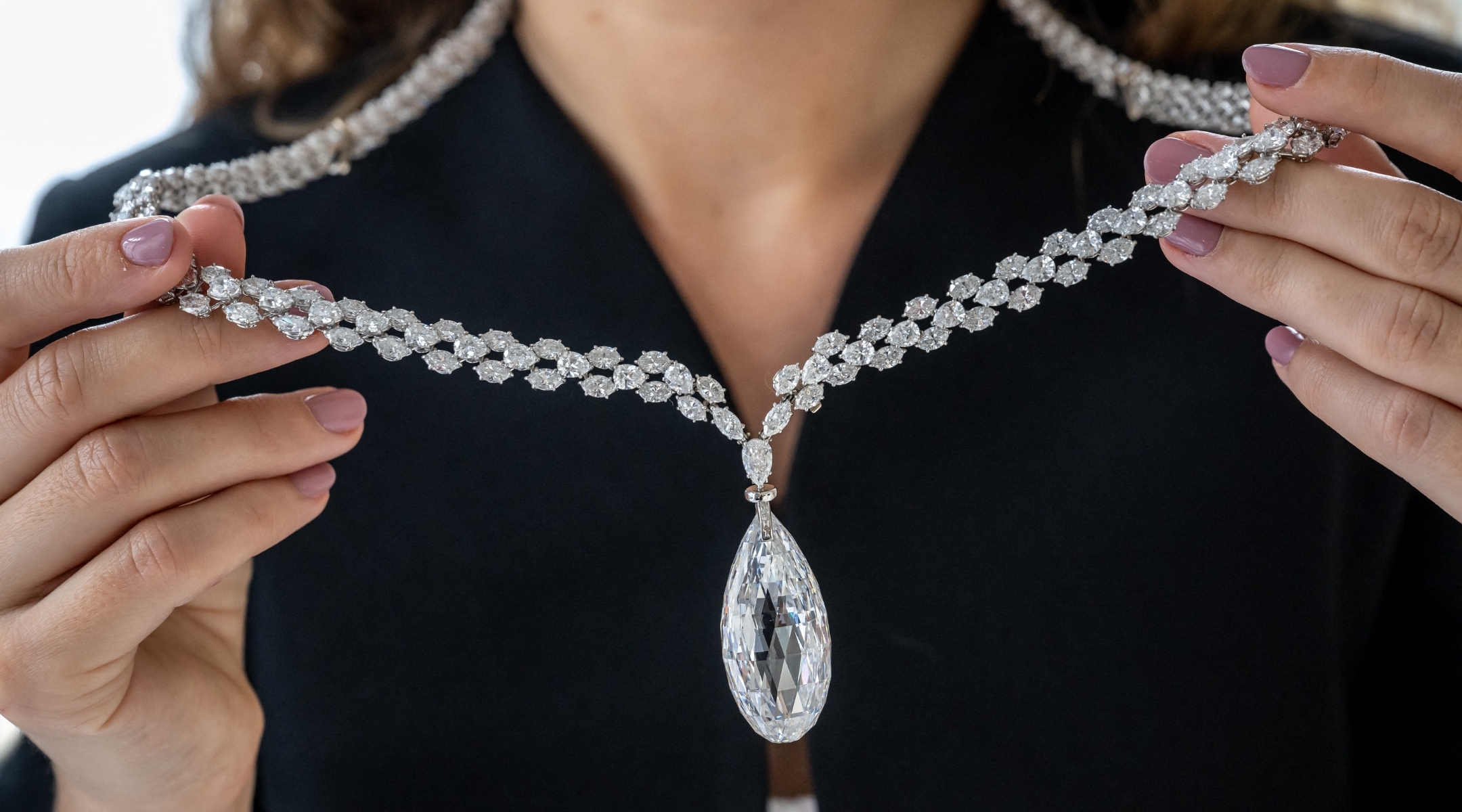Jewelry with Nazi ties fetches record prices at Christie’s auction amid controversy
Multiple Jewish groups had sought to halt the auction of jewelry owned by Heidi Horton, whose German husband was a Nazi

The “Briolette of India” diamond necklace from the Heidi Horten collection sold for more than $7 million. (Fabrice Coffrini/Getty)
(JTA) — A blockbuster jewelry auction at Christie’s is drawing criticism because of the gems’ ties to a Nazi.
The pieces sold Monday belonged to the late Heidi Horten, an Austrian art collector whose husband, Helmut Horten, was a Nazi Party member. The items fetched a total of $202 million, making the auction the largest jewelry sale in history.
Some Jewish groups had urged Christie’s to halt the sale, citing Helmut Horten’s record during the Nazi era, when he amassed a fortune after buying businesses whose Jewish owners sold them under duress, often at steeply discounted prices. Horten used that wealth to propel his company, which ultimately was responsible for introducing American-style supermarkets in Germany.
Heidi Horten was born in 1941 and was more than 30 years younger than her husband. When he died in 1987, she inherited nearly $1 billion, according to The New York Times. Heidi Horten died last year at age 81.
Associations representing Jews and Holocaust survivors criticized the auction because of the origin of the wealth that paid for the jewelry. David Schaecter, president of Holocaust Survivors’ Foundation USA, said the auction continues “a disgraceful pattern of whitewashing Holocaust profiteers,” according to the Times.
“Christie’s must suspend this sale until full research [into the] link to Nazi era acquisitions [is] completed,” Rabbi Abraham Cooper, the associate dean of the Simon Wiesenthal Center, said in a statement earlier this month urging Christie’s to halt the auction. “Don’t reward those whose families may have gained riches from desperate Jews targeted and threatened by the Nazis.”
Christie’s also drew fire for not initially including any mention of the Jewish businesses in its marketing materials for the auction. Its website now includes a brief note stating that the provenance of Horten’s wealth is “a matter of public record. The business practices of Mr. Horten during the Nazi era, when he purchased Jewish businesses sold under duress, are well documented.”
The auction house has committed to donating a portion of its commission to organizations that contribute to Holocaust research and education. It did not specify which organizations would receive the funds, saying only in a statement that it would be up to those organizations to “communicate about these donations.”
Proceeds from the sale of the jewels will be donated to the Heidi Horten Foundation, which supports children’s welfare and medical research, in addition to funding the Heidi Horten Collection, an art museum in Vienna. The museum boasts works by Pablo Picasso and Pierre-Auguste Renoir, as well as Jewish artists such as Marc Chagall, who escaped the Nazis, and Roy Lichtenstein.
The museum’s website includes a brief mention of Helmut Horten’s wealth accumulation under the Nazis, stating that Heidi Horten hired a historian to research and write “a scientific report on Helmut Horten’s build-up of assets and business in the context of ‘Aryanization’ during the ‘Third Reich.’”
That report, which was published last year, concluded that while Horten benefited from his purchase of Jewish-owned businesses, he was not an enthusiastic Nazi and was expelled from the party, and briefly imprisoned, near the end of World War II.
“There is not a saint and not a devil, but there is Horten who … benefited from the circumstances of the tyranny of the Nazis,” the historian, Peter Hoeres, told the Associated Press. “You can’t say Horten was part of the resistance against the dictatorship.”
The Heidi Horten Foundation appears to be separate from a foundation bearing the name of her husband. On the website of the Helmut Horten Foundation, a page with a biography of Horten does not mention Jews, the Holocaust or the Nazi Party by name, though it does have a short section referencing Hoeres’ report. It says Horten was a “liberal,” and that the foundation “considers it extremely important to review and understand its founder’s history in the best possible way.”
“This auction is doubly indecent,” Yonathan Arfi, chairman of CRIF, the umbrella organization for French Jewry, said in a statement. “The funds that made it possible to acquire these jewels are partly the result of the Aryanization of Jewish property carried out by Nazi Germany, but in addition, this sale will contribute to a foundation whose mission it is to ensure the name of a former Nazi for posterity.”
More than 400 pieces of Heidi Horten’s jewelry were sold in the auction, both online and in person in Geneva, Switzerland, including jewels from brands Bulgari, Van Cleef and Arpels, Cartier, and Harry Winston, with many diamond, pearl, and colored gemstone pieces individually estimated to be worth millions of dollars. The last 300 lots from Horten’s collection are scheduled to be sold in November.
This article originally appeared on JTA.org.















